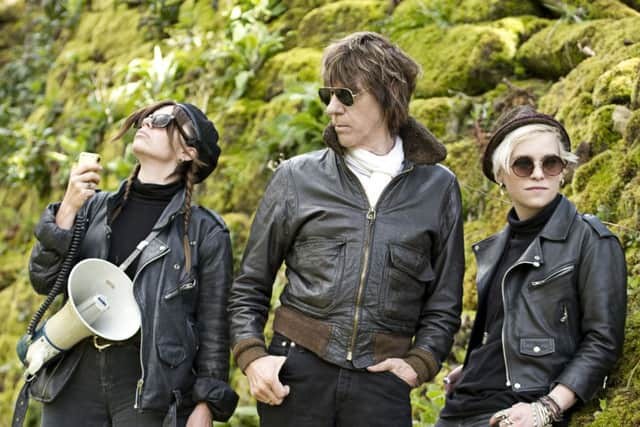Album reviews: Jeff Beck | Roisin Murphy | The Mirror Trap


First, Paul Simon determines to break with tradition and avoid stagnation, and now his classic rock contemporary Jeff Beck makes a concerted effort to get out of his guitar nerd comfort zone, swapping the chin-stroking Guitar World for this punkier “statement album” (***) which gets up on its soapbox to make a whole lotta noise about a handful of social, political and cultural hot topics.
Although Loud Hailer bears Beck’s name, it is a collaboration with guitarist Carmen Vandenberg and singer/lyricist Rosie Bones, aka Rosie Oddie, daughter of Goodies legend Bill. Bones is not a rock vocalist so it’s not always the most comfortable of musical matches but she attacks her chosen targets with a terrier-like snarl while Beck lays on the distortion-heavy industrial licks.
Advertisement
Hide AdAdvertisement
Hide AdTogether, the trio light a candle rather than curse the darkness on the defiant, anthemic and solidly catchy chant Live In The Dark. Next, they take political elites to task on Thugs Club, Bones’ half-spoken vocals dripping with sarcasm (“as long as David’s alright….”) as she dances over Beck’s increasingly demented dust bowl keening.


The Ballad Of The Jersey Wives is not an easy tilt at reality TV, but pays tribute to the tenacity of four 9/11 widows in their campaign for an independent commission to investigate the attacks – and, by extrapolation, to anyone who fights tirelessly for justice and truth - while the clipped funky O.I.L. (Can’t Get Enough Of That) is an ode to the first world’s favourite addictive mineral, sung as a suggestive come-on by a breathy Bones.
However, she veers close to parody on the mawkish ballad Scared For The Children. It’s all too easy to imagine spoof rocker Brian Pern earnestly singing “this is the end of the age of the innocent” while Beck holds forth as usual.
Beck and co are on altogether safer ground on the more traditional rhythm’n’blues ballad Shame, which suits Bones’ huskier tones – even though safe territory was never the aim of their game.
Roisin Murphy takes her reputation as queen of the club chill-out zone to zen extremes on Take Her Up To Monto (**), a spare electro collection of material recorded at the same time as her similarly understated Hairless Toys album. The mellow music is frustratingly free of hooks or even Murphy’s great capacity for winning quirks. Some tracks are so subtle as to be barely there and while Murphy’s restraint is to be admired in an age of vacuous declamation, she only shows a fraction of what she is capable of producing. At least the heady, sultry electro pop of Pretty Gardens, knowing lounge bar bossa nova of Lip Service, mellow Latin-infused house of Romantic Comedy and wispy delicacy of Whatever stand out – subtly – from the muted pack.


The Mirror Trap don’t hold much back on their latest release (***). Following their 2014 debut Stay Young, these Dundonian indie rockers caught the ear of Placebo frontman Brian Molko, who liked them so much he bought the company (or their publishing, to be precise). Simulations was recorded at the Thai studio recently used by The Libertines, but there is nothing of the detox retreat here – simply mean indie attitude dispensed with a curled lip, strident guitar jangling, frenetic drumming and hell-for-leather momentum to the last gasp. At which point frontman Gary Moore rasps “we’re just so much better together” in a manner which suggests the listener had better watch their back. Fiona Shepherd
CLASSICAL: Brahms: Works for Solo Piano, Vol 6 | Rating: **** | Chandos
Advertisement
Hide AdAdvertisement
Hide AdBarry Douglas’ sixth and final disc in his survey of Brahms’ piano music is both climactic and circumspect. Climactic, of course, because it is the apotheosis of a monumental and authoritative project, which has revealed an evergreen freshness in Douglas’ pianistic insightfulness. And circumspect in the sense that this final recording has a sense of universal self-containment to it that rather sums up the overall achievement.
We have Brahms, the lover of Bach, precision-engineered in the two quasi-Baroque Gigues. There’s Brahms the teacher and arranger, viewed through a series of studies and character pieces emulating the likes of Chopin and Weber, or freely arranging Gluck. The real meat, however, exists in such originally-conceived works as the Intermezzi and Hungarian Dances, all of which enjoy sizzling, disciplined precision in Douglas’ expert hands. Ken Walton
JAZZ: New Focus: On Song | Rating: **** | Whirlwind Recordings
Jazz and strings can be uneasy bedfellows, but, as with their acclaimed 2012 debut album, pianist Euan Stevenson and saxophonist Konrad Wiszniewski demonstrate convincingly that things needn’t be so. From the opening pulse of Air in D Minor, once again they’ve come up with a highly organic and lyrical collaboration.
There is glowing tenor sax and delicate piano in the easeful journeying of Destination Unknown, while Wiszniewski switches between sax and velvety whistle in his own Sophia’s Song, one of several appealing melodies on the album, another being Stevenson’s beguilingly simple Flora.
There are some luscious moments as jazz and string quartets entwine, as in Ascension. Things become more torrid in Little Allegory, with tolling piano and sax ‘n’ strings riffing, while in the beaty Fourths Ostinato, the ensemble cruises like a small big band. Jim Gilchrist